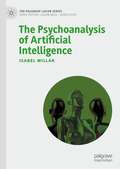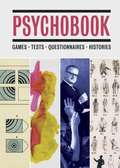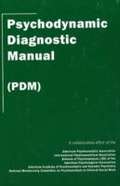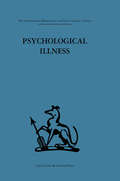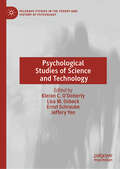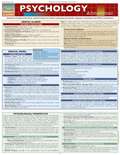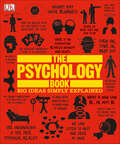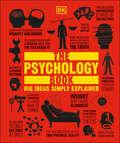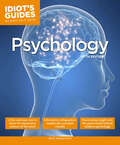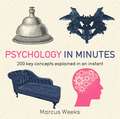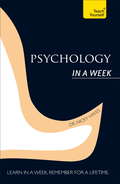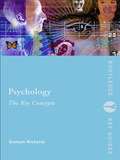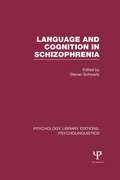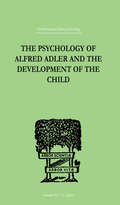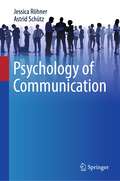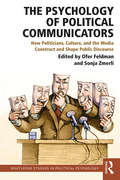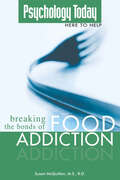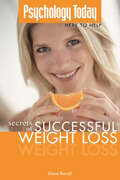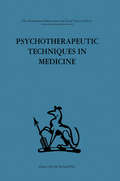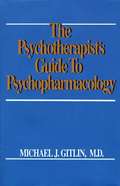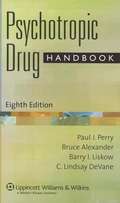- Table View
- List View
The Psychoanalysis of Artificial Intelligence (The Palgrave Lacan Series)
by Isabel MillarThis book examines the crucial role of psychoanalysis in understanding what AI means for us as speaking, sexed subjects. Drawing on Lacanian theory and recent clinical developments it explores what philosophy and critical theory of AI has hitherto neglected: enjoyment. Through the reconceptualization of Intelligence, the Artificial Object and the Sexual Abyss the book outlines the Sexbot as a figure who exists on the boundary of psychoanalysis and AI. Through this figure and the medium of film, the author subverts Kant’s three Enlightenment questions and guides readers to transition from asking 'Does it think?' to 'Can it enjoy?' The book will appeal in particular to students and scholars of psychoanalysis, philosophy, film and media studies, critical theory, feminist theory and AI research.
Psychoanalytic Theories of Development: An Integration
by Phyllis Tyson Robert L. TysonThorough review of psychological development starting at infancy going through adulthood with emphasis on major developmental milestones.
Psychobook: Games, Tests, Questionnaires, Histories
by Wall Oison Lionel Shriver Mel Gooding Julian RothensteinWho knew a trip to the therapist could be so much fun, even aesthetically rewarding? Beyond sharing feelings or complaining about your mother, Psychobook reveals the rich history of psychological testing in a fascinating sideways look at classic testing methods, from word-association games to inkblots to personality tests.Psychobook includes never-before-seen content from long-hidden archives, as well as reimagined tests from contemporary artists and writers, to try out yourself, at home or at parties. A great ebook for the therapist in your life and the therapist in you, for anyone interested in the history of psychology and psychological paraphernalia, or for anyone who enjoys games and quizzes. Psychobook will brighten your day and outlook.
Psychodynamic Diagnostic Manual
by Alliance of Psychoanalytic OrganizationsThis manual is based on current neuroscience and treatment outcome studies that demonstrate the importance of focusing on the full range and depth of emotional and social functioning. Beginning with a classification of the spectrum of personality patterns and disorders found in individuals and then describing a profile of mental functioning that permits a clinician to look in detail at each of the patient's capacities, the entries include a description of the patient's symptoms with a focus on the patient's internal experiences as well as surface behaviors. Intended to expand on the DSM (Diagnostic and Statistical Manual of Mental Disorders)and ICD (International Statistical Classification of Diseases and Related Health Problems) efforts in cataloging the symptoms and behaviors of mental health patients, this manual opens the door to a fuller understanding of the functioning of the mind, brain, and their development.
Psychological Illness: A community study
by E J R PrimroseTavistock Press was established as a co-operative venture between the Tavistock Institute and Routledge & Kegan Paul (RKP) in the 1950s to produce a series of major contributions across the social sciences. This volume is part of a 2001 reissue of a selection of those important works which have since gone out of print, or are difficult to locate. Published by Routledge, 112 volumes in total are being brought together under the name The International Behavioural and Social Sciences Library: Classics from the Tavistock Press. Reproduced here in facsimile, this volume was originally published in 1962 and is available individually. The collection is also available in a number of themed mini-sets of between 5 and 13 volumes, or as a complete collection.
Psychological Studies of Science and Technology (Palgrave Studies in the Theory and History of Psychology)
by Lisa M. Osbeck Ernst Schraube Kieran C. O’Doherty Jeffery YenThis book provides a significant contribution to scholarship on the psychology of science and the psychology of technology by showcasing a range of theory and research distinguished as psychological studies of science and technology. Science and technology are central to almost all domains of human activity, for which reason they are the focus of subdisciplines such as philosophy of science, philosophy of technology, sociology of knowledge, and history of science and technology. To date, psychology has been marginal in this space and limited to relatively narrow epistemological orientations. By explicitly embracing pluralism and an international approach, this book offers new perspectives and directions for psychological contributions. The book brings together leading theorists and researchers from around the world and spans scholarship across a variety of traditions that include theoretical psychology, critical psychology, feminist psychology and social constructionist approaches. Following a historical and conceptual introduction, the collection is divided into three sections: Scoping a New Psychology of Science and Technology, Applying Psychological Concepts to the Study of Science and Technology and Critical Perspectives on Psychology as a Science. The book will interest interdisciplinary scholars who work in the space of Science and Technology Studies and psychologists interested in the diverse human aspects of science and technology.
The Psychologist’s Companion
by Sternberg Robert J. Karin SternbergThe Psychologist's Companion is intended for students as well as young professionals and writers at all stages of their careers seeking inspiration and guidelines for better scientific writing. This book is also a resource for researchers in related fields. It has been comprehensively updated, revised, and extended for its fifth edition and includes the latest style guidelines of the American Psychological Association's Publication Manual (sixth edition, 2009) as well as chapters encompassing the entire research process from doing literature research and planning an experiment to writing the paper. It features new chapters on literature research; ethics; and generating, evaluating, and selling ideas. The Psychologist's Companion also provides information on writing book proposals, grant proposals, and lectures.
The Psychologist's Companion
by Robert J. Sternberg Karin SternbergThe Psychologist's Companion is intended for students as well as young professionals and writers at all stages of their careers seeking inspiration and guidelines for better scientific writing. This book is also a resource for researchers in related fields. It has been comprehensively updated, revised, and extended for its fifth edition and includes the latest style guidelines of the American Psychological Association's Publication Manual (sixth edition, 2009) as well as chapters encompassing the entire research process from doing literature research and planning an experiment to writing the paper. It features new chapters on literature research; ethics; and generating, evaluating, and selling ideas. The Psychologist's Companion also provides information on writing book proposals, grant proposals, and lectures.
Psychology: Abnormal
by Albert E. LyngzeidetsonPsychology students and those already practicing in the field will want to obtain this jam-packed, 3-panel (6 page) expanded version of BarCharts popular Psychology: Abnormal guide. The new information, along with the original guide text, lists a variety of mental disorders and the therapies used to treat them; each color-coded section features key definitions and examples for easy reference.
The Psychology Book: Big Ideas Simply Explained (DK Big Ideas)
by DKLearn about human nature, behavior and how the mind works with The Psychology Book.Part of the fascinating Big Ideas series, this book tackles tricky topics and themes in a simple and easy to follow format. Learn about Psychology in this overview guide to the subject, great for beginners looking to learn and experts wishing to refresh their knowledge alike! The Psychology Book brings a fresh and vibrant take on the topic through eye-catching graphics and diagrams to immerse yourself in. This captivating book will broaden your understanding of Psychology, with:- More than 100 ground-breaking ideas in this field of science- Packed with facts, charts, timelines and graphs to help explain core concepts- A visual approach to big subjects with striking illustrations and graphics throughout- Easy to follow text makes topics accessible for people at any level of understandingThe Psychology Book is the perfect introduction to the science, aimed at adults with an interest in the subject and students wanting to gain more of an overview. Here you&’ll discover key concepts by psychologists who have significantly enhanced our understanding of the human mind and behavior. Learn about everyone who&’s contributed to the big ideas in psychology, incorporating the ideas of today&’s scientists as well those of the ancient philosophers and pioneers. Your Psychology Questions, Simply ExplainedIf you thought it was difficult to learn psychology and its many concepts, The Psychology Book presents the key ideas in a clear layout. Learn about the key personalities of the 19th and 20th centuries whose work has made significant contributions to our understanding of human behavior. Fantastic mind maps and step-by-step summaries explain the line of thought clearly for students of psychology and for anyone with a general interest in understanding the human mind.The Big Ideas SeriesWith millions of copies sold worldwide, The Psychology Book is part of the award-winning Big Ideas series from DK. The series uses striking graphics along with engaging writing, making big topics easy to understand.
The Psychology Book: Big Ideas Simply Explained (DK Big Ideas)
by DKLearn about human nature, behavior and how the mind works with The Psychology Book.Part of the fascinating Big Ideas series, this book tackles tricky topics and themes in a simple and easy to follow format. Learn about Psychology in this overview guide to the subject, great for beginners looking to learn and experts wishing to refresh their knowledge alike! The Psychology Book brings a fresh and vibrant take on the topic through eye-catching graphics and diagrams to immerse yourself in. This captivating book will broaden your understanding of Psychology, with:More than 100 ground-breaking ideas in this field of sciencePacked with facts, charts, timelines and graphs to help explain core conceptsA visual approach to big subjects with striking illustrations and graphics throughoutEasy to follow text makes topics accessible for people at any level of understandingThe Psychology Book is the perfect introduction to the science, aimed at adults with an interest in the subject and students wanting to gain more of an overview. Here you’ll discover key concepts by psychologists who have significantly enhanced our understanding of the human mind and behavior. Learn about everyone who’s contributed to the big ideas in psychology, incorporating the ideas of today’s scientists as well those of the ancient philosophers and pioneers. Your Psychological Questions, Simply ExplainedIf you thought it was difficult to learn psychology and its many concepts, The Psychology Book presents the key ideas in a clear layout. Learn about the key personalities of the 19th and 20th centuries whose work has made significant contributions to our understanding of human behavior. Fantastic mind maps and step-by-step summaries explain the line of thought clearly for students of psychology and for anyone with a general interest in understanding the human mind.The Big Ideas SeriesWith millions of copies sold worldwide, The Psychology Book is part of the award-winning Big Ideas series from DK. The series uses striking graphics along with engaging writing, making big topics easy to understand.
Psychology, Fifth Edition (Idiot's Guides)
by Joni E. JohnstonAuthored by a clinical psychologist, Idiot's Guides: Psychology, Fifth Edition, breaks down all of the complexity of the human mind. Key concepts are explained in plain and simple language, and are supplemented with insightful infographics that help explain each concept in a visual format. Readers will learn everything from the physiology of the brain to the most popular theories of modern psychology to the most famous pioneers in the field (such as Freud and Jung). From behaviorism to social psychology to cognitive psychology, readers will learn what makes all of us tick and why we are who we are.
Psychology in Minutes
by Marcus WeeksTo what extent is memory based on mood? Why do we compare ourselves to others? Are there different types of intelligence? How do we change with age? This book answers all these questions and many more in 200 short and accessible essays.From Pavlov's dogs to experimental ethics and from the development of personality to cognitive behavioral therapy, this book will take you from the foundations of psychological thought to modern-day applications, drawing on recent research and established theories. Each essay is accompanied by an illustration or diagram to help unravel complex ideas.The principles of psychology apply to each and every one of us as they shed light on everything from our childhood development to our interaction with others--and Psychology in Minutes is the perfect insight to this fascinating subject.Contents include: Behaviorism, Experimental ethics, Problem solving, Illusions and paradoxes, Dream analysis, Management and leadership, Compliance and conformity, Attitudes and prejudices, Attraction, Moral development, Gender development, The big five personality traits, Classification of mental disorders, Criticisms of psychoanalysis, Positive psychology, Advertising and the media and The working environment.
Psychology In A Week: Teach Yourself
by Nicky HayesLearn in a week, remember for a lifetime!In just one week, this accessible book will give you knowledge to last forever. End of chapter summaries and multiple choice questions are all designed to help you test your knowledge and gain confidence. So whether you are a student or you simply want to widen your knowledge, you will find this seven-day course a very memorable introduction.Sunday: Learn how humans grow up in and adapt to a social environmentMonday: Discover what emotions are and what affects our state of mindTuesday: Consider why we are motivated to do what we doWednesday: Discover the Buddhist scriptures and learn how they are interpreted today.Thursday: Engage with evolutionary psychology and the role of genes. Think about what intelligence is and how it comes about.Friday: Discover the factors influencing the psychological development of children, adolescents and adults.Saturday: Explore what psychologists do and how
Psychology In A Week: Teach Yourself
by Nicky HayesLearn in a week, remember for a lifetime!In just one week, this accessible book will give you knowledge to last forever. End of chapter summaries and multiple choice questions are all designed to help you test your knowledge and gain confidence. So whether you are a student or you simply want to widen your knowledge, you will find this seven-day course a very memorable introduction.Sunday: Learn how humans grow up in and adapt to a social environmentMonday: Discover what emotions are and what affects our state of mindTuesday: Consider why we are motivated to do what we doWednesday: Discover the Buddhist scriptures and learn how they are interpreted today.Thursday: Engage with evolutionary psychology and the role of genes. Think about what intelligence is and how it comes about.Friday: Discover the factors influencing the psychological development of children, adolescents and adults.Saturday: Explore what psychologists do and how
Psychology: The Key Concepts (Routledge Key Guides)
by Graham RichardsPsychology: The Key Concepts is a comprehensive overview of 200 concepts central to a solid understanding of Psychology and includes the latest recommendations from the British Psychology Society (BPS). The focus is on practical uses of Psychology in settings such as nursing, education and human resources, with topics ranging from Gender to Psychometrics and Perception.
Psychology Library Editions: Psycholinguistics (Psychology Library Editions: Psycholinguistics)
by Doris Aaronson Robert W. RieberPsychology Library Editions: Psycholinguistics brings together as one set, or individual volumes, a series of previously out-of-print titles, originally published between 1970 and 1990. From a variety of academic imprints this set reflects the growth of psycholinguistics as a serious scientific discipline in its own right. It provides in one place a wealth of important reference sources from a wide range of authors expert in the field.
The Psychology Of Alfred Adler: and the Development of the Child (International Library Of Psychology Ser.)
by Ganz, MadelaineFirst Published in 1999. Routledge is an imprint of Taylor & Francis, an informa company.
Psychology of Communication
by Jessica Röhner Astrid SchützThis successful textbook on the psychology of communication explains - here in English for the first time - how human communication works in a very understandable way. It begins with the explanation of central terms and the explanation of known communication models (e.g. the models according to Schulz von Thun, Watzlawick, Hargie and colleagues), then describes means of non-verbal and verbal communication and ends with a clear and structured summary of communication forms. Concrete fields of application, stumbling blocks (e.g. intercultural differences in communication), practical examples and digressions in the book round off what has been read and consolidate what has been learned. In addition, free learning materials are available on the Internet with which readers can test their knowledge acquisition.
The Psychology of Political Communicators: How Politicians, Culture, and the Media Construct and Shape Public Discourse (Routledge Studies in Political Psychology)
by Ofer Feldman Sonja ZmerliIn this timely study, Ofer Feldman, Sonja Zmerli, and their team of experts shed light on the multiple ways communication affects political behavior and attitudes. Written for students and scholars alike, The Psychology of Political Communicators uses examples from the US, Europe, Asia, and the Middle East to examine the nature, characteristics, content, and reception of communication in three major areas of discourse: The style and nature of language used by political actors in the national and international arenas The discourse used in nationalist populist movements and during negative campaigns The rhetoric of the media as it tries to frame politics, political events, and political actors Collectively, the essays form a solid foundation on which to understand the different roles language plays in the conduct of politics, the way in which these roles are performed in various situations in different societies and cultures, and the political outcomes of verbal behavior. This book will be of interest to scholars and students of political psychology and communication studies.
Psychology Today: Breaking the Bonds of Food Addiction
by Susan McQuillanFinally, freedom from food addiction! From Alpha Books and Psychology Today magazine comes expert advice that explains the whys and hows of food obsession and compulsive overeating. Readers will gain the background and tools needed to fashion a plan for happier, healthier living and help themselves out of compulsive overeating-starting right now. It also shows readers how to work out individual food issues, move beyond addiction, and maintain a healthy, lifelong relationship with food. More than 135 million Americans are estimated to be either overweight or obese American Journal of Clinical Nutrition reported that Americans spend nearly $45 billion annually on weight-loss products and services and the American Dietary Association indicates that 65% of all women are currently dieting or plan to start a diet in 2004
Psychology Today: Secrets of Successful Weight Loss
by Diana BurrellPsychology Today-changing the way readers think about losing weight. Written in the popular yet authoritative style of Psychology Today magazine, this groundbreaking book offers much more than a weight-loss program. It offers an understanding of the personal and social forces conspiring against healthy weight loss, conditions that make losing weight more difficult, an overview of every method-from Atkins to bariatric surgery-and sound advice on the importance of exercise and lifestyle changes.
Psychotherapeutic Techniques in Medicine
by Michael Balint Enid BalintTavistock Press was established as a co-operative venture between the Tavistock Institute and Routledge & Kegan Paul (RKP) in the 1950s to produce a series of major contributions across the social sciences. This volume is part of a 2001 reissue of a selection of those important works which have since gone out of print, or are difficult to locate. Published by Routledge, 112 volumes in total are being brought together under the name The International Behavioural and Social Sciences Library: Classics from the Tavistock Press. Reproduced here in facsimile, this volume was originally published in 1961 and is available individually. The collection is also available in a number of themed mini-sets of between 5 and 13 volumes, or as a complete collection.
The Psychotherapist’s Guide to Psychopharmacology
by Michael J. GitlinGitlin (psychiatry, UCLA) provides a guide to medicines used for treating mental and emotional disorders, designed to familiarize mental health professionals who do not prescribe medicine with the latest medical treatment options. He describes the type of treatment used for numerous disorders, explaining in detail how each medication works and its effects.
Psychotropic Drug Handbook
by Paul J. Perry; Bruce Alexander; Barry I. Liskow; C. Lindsay DeVaneThis succinct handbook provides students and practitioners with clinically relevant psychotropic drug information. The Eighth Edition is designed as a reference text that also teaches by delivering informative narrative text under standard headlines with references. Its focus goes beyond drug information to cover pharmacotherapy applications. <p><p> The book provides detailed, well-referenced, evidence-based information on a wide range of psychotropic drugs, including mood stabilizers, antidepressants, and antianxiety agents. This edition has new chapters on pediatric and geriatric psychopharmacotherapy; new content on antipsychotics, hypnotics, medications used in treating alcoholism and substance dependence, and electroconvulsive therapy; and new algorithms, appendices, and tables.
